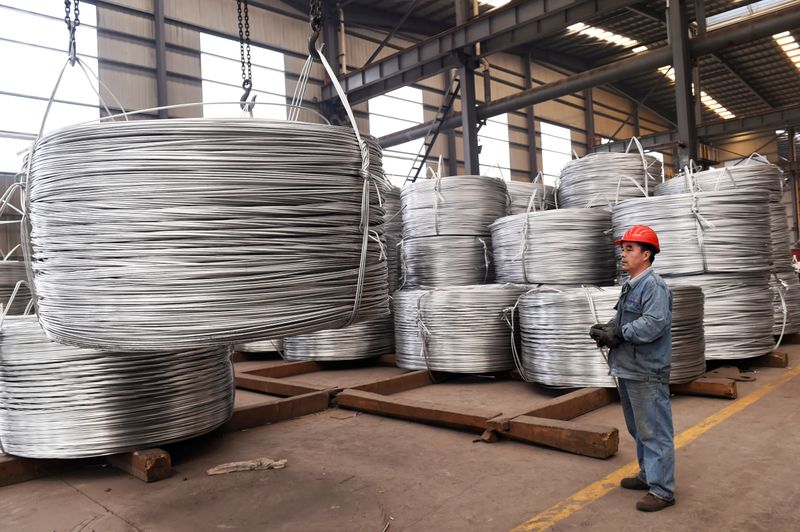By Tom Daly and Shivani Singh
(Reuters) - For the first time in a decade, China has released some of its strategic metal stocks to try to dampen a price rally hurting manufacturers. It has also released coal and imported corn reserves to cool prices, while buying pork to prop up that market.
China is the world's largest user of commodities and has built up vast reserves. The following are details of key commodities and estimates and assessments of strategic reserve levels
(For graphic on China’s Commodities Market Share vs Rest of World - https://fingfx.thomsonreuters.com/gfx/ce/lbpgnrnoqvq/China%20Commodities%20Market%20Share.jpg)
METALS
Based on past stockpiling activity, analysts estimate China's strategic reserves hold 1.5 million to 2 million tonnes of copper, 800,000-900,000 tonnes of aluminium and 250,000-400,000 tonnes of zinc.
The reserves administration also stockpiles key battery metal cobalt, of which industry sources estimate China is holding some 7,000 tonnes. It also keeps nickel and other metals including antimony, indium, germanium and molybdenum oxide.
It is not thought to hold any tin or lead, according to The International Tin Association and International Lead and Zinc Study Group, respectively.
GRAINS AND MEAT
China's grain reserves are sufficient to feed its 1.4 billion citizens, with the storage capacity exceeding 650 million tonnes, Xinhua reported in April, but did not specify how long the reserves could feed the population.
Grains stockpiler Sinograin will start building 120 storage facility projects, totalling 10.85 million tonnes of capacity, official media reported in July.
Stocks of rice and wheat are enough to meet more than one year of the country's consumption, Liang Yan, deputy head of the reserves administration, told a news conference in April.
Wheat and rice make up about 70% of China's state grain reserves, which are held both centrally and at local levels, state TV reported in August 2020.
(For graphic on China's share of world crop stocks since 2000/2001 - https://fingfx.thomsonreuters.com/gfx/ce/zgpomwnobpd/ChinaShareofCropStocks.png)
The country's meat reserves held almost 1 million tonnes of pork by 2019, according to a South China Morning Post report at the time citing an analyst.
Pork needs to be regularly rotated to ensure it does not spoil.
China's state corn reserves were estimated at around 200 million tonnes in 2017, according to market consensus, and have been whittled down to almost zero by 2020 as the agency sold off ageing grain.
Beijing sold more than 56 million tonnes of corn from its reserves in 2020, according to Reuters calculations, based on statements released on the website of the National Grain Trade Centre.
China stepped up imports of pork for its reserves after African swine fever reached the country in August 2018 and wiped out 50% of the country's pigs within a year.
State-owned Cofco's meat division said in 2019 it was more than doubling the amount it would spend annually on procuring meat for the central reserves to a maximum of 1.48 billion yuan ($228.6 million) in 2020 and 2021.
That would buy about 115,000 tonnes, based on a cost of around $2,000 per tonne for imported pork, according to Reuters calculations.
ENERGY
China's SPR sites currently hold 220 million barrels of crude oil, equivalent to 15 days of demand, consultancy Energy Aspects estimates.
However total crude oil inventories, including the SPR, commercial storage and those at oil firms, are estimated to be able to cover 60 days of consumption, said Liu Yuntao analyst at Energy Aspects.
The International Energy Agency, Paris-based watchdog, recommends members keep 90 days of net oil imports in reserve, although China is not a member.
The last public SPR update was in 2017 when the National Bureau of Statistics said China had built nine storage bases with total reserve capacity of 37.73 million cubic metres, or 237.66 million barrels, of crude oil.
In September 2019, China's National Energy Administration said the country had oil inventories that could last 80 days and included those in the SPR, storage at oil firms and commercial tanks. [https://www.reuters.com/article/china-energy-idAFL3N26B2KN]
China has been more candid on coal. The National Development and Reform Commission, the state planner, called in April for coal reserves to reach more than 120 million tonnes this year.
The commission also set a target of building 400 million tonnes of commercial coal reserves, with power plants expected to hold about 200 million tonnes, coal miners 100 million tonnes and coal distributors 100 million tonnes.
($1=6.4752 yuan)
<^^^^^^^^^^^^^^^^^^^^^^^^^^^^^^^^^^^^^^^^^^^^^^^^^^^^^^^^^^^
China’s Commodities Market Share vs Rest of World (%) https://tmsnrt.rs/3BqDS8T
China's share of world crop stocks since 2000/2001 https://tmsnrt.rs/2Wk2oZe
^^^^^^^^^^^^^^^^^^^^^^^^^^^^^^^^^^^^^^^^^^^^^^^^^^^^^^^^^^^>
